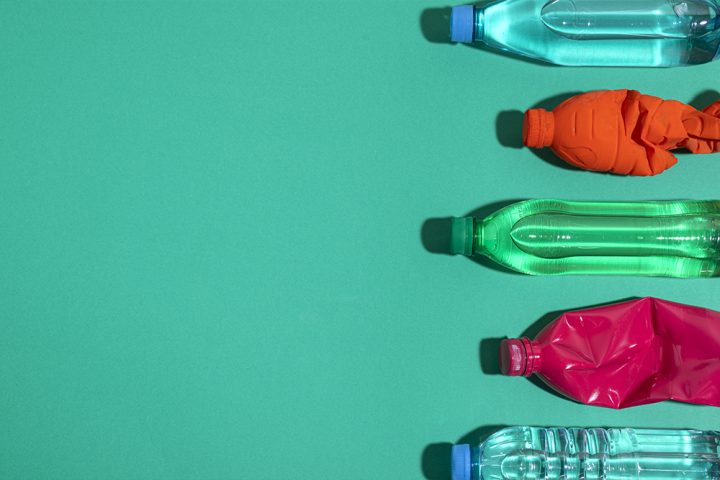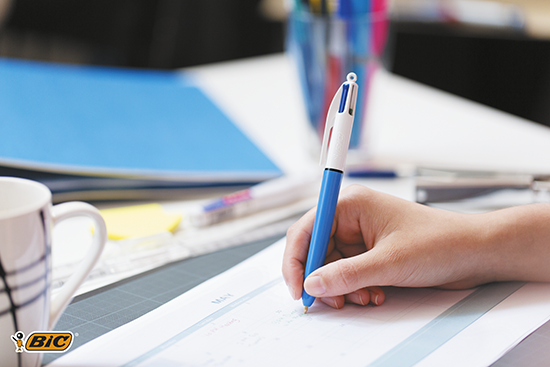
Reuse: a growing trend
The packaging sector is far from alone in its interest in reusing and recycling. Some businesses have succeeded in making truly brilliant products, often from end-of-life plastics…
Bic, the former king of single-use products, makes a U-turn
In a bid to boost their reuse policy, some brands are prepared to give up the very thing they’re known for in the first place. This is certainly the case for Bic, a global household name known for its disposable products, especially its pens. Nonetheless, the disposable pen is a thing of the past at Bic, and refills are now available for the entire range. The idea is you keep the polystyrene barrel and refill the polypropylene ink tube, much like you would with a fountain pen or lipstick tube. This now applies to virtually all of Bic’s writing equipment, including the iconic four-colour pen, which is now available in the wildest colours.

|
When reuse meets repair
In June 2023, the Optic 2000 group of opticians and spectacle makers launched its second life programme, “Revue”. This programme aims to improve and develop the durability and reuse of eyewear. This involves recovering, repairing and refurbishing sunglasses to give them a new lease of life, redistributing them to charities and recycling optical equipment.

Brands like Optic 2000 are now recovering unwanted sunglasses, fixing them up and giving them to charitable organisations. |
Since most lenses are made from polycarbonate and most frames are made from polyamide or polyurethane, plastics are the focus here. In 2022, Optic 2000 confirmed that it had donated more than 27,000 pairs of glasses and 10,000 cases. On top of that, it recycled 4.1 tonnes of eyewear. |
The new life of Ken and Barbie
Mattel, the manufacturer of the iconic Barbie doll, is also paying more attention to its environmental impact. Having launched a Barbie made from plastics recovered from the world’s oceans, the toy designer is now launching a reuse programme in the UK, France and Germany. Once the toys have been collected from shops (they can also be sent via post using the pre-paid label available on their website), they are taken to specialist centres to be cleaned.
|
Those that are extensively damaged will be mechanically recycled to produce new products, while dolls in good condition will be distributed free of charge to charities, leisure centres and schools rather than sold on the second-hand market. Barbies are mostly made from PVC, though they also contain EVA (arms) and ABS (torso), all of which are polymers that are easy to clean without being degraded, making them perfectly suited to this programme. |

The same goes for Mattel, which collects Barbies that are no longer used, cleans them up and donates them to various charities. |
Chic upcycling
Some brands have made a name for themselves by salvaging plastic parts destined for landfill and transforming them into stunning, fashionable items. This is the case for the Swiss company Freitag, which cleans old truck tarpaulins and transforms them into stylish bags. Like the Barbie dolls, these tarps are made from PVC, a material that’s particularly suitable for reuse. The same goes for the French company La Virgule, which recovers vinyl from Zodiac-style boats. With the help of a sewing machine, polyester from used sails is given a second life in the form of bags and purses. Many of these brands really run with the idea of upcycling, even recycling car seatbelts to make straps.

Some brands have become popular by designing products using end-of-life plastic materials. |
Today, upcycling is a popular concept amongst creators and designers, and there are plenty of examples of this online. You can find scrunchies made from nylon tights, kits for making school bags out of PET bottles, and lampshades made from HDPE cans, to name but a few. Although such projects tend to be done on a smaller scale, the principle is still the same: using recovered packaging to create everyday items or decorative objects (see https://plastic-lemag.com/plein-phare-sur-lupcycling or https://plastic-lemag.com/Des-dechets-sublimes-avec-la-Pet-Lamp). Some initiatives are completely altruistic, striving towards both humanitarian and environmental objectives. This is the case for BottleBag, a shopping bag made from strips of cut and woven PET bottles that’s a big hit on the African continent. Its designer has chosen to remain anonymous, posting nothing more than a tutorial on how to make the bag.
Repairability: the other challenge of our time
Other companies are working to make their products (almost) indestructible, for example, suitcase manufacturer Dot-Drops. This company offers eco-friendly luggage that comes with lifetime repair and a 20-year warranty! With different parts made from different polymers, the cases are easy to dismantle. The shell is made from polypropylene and is able to withstand all types of impact, the wheels are made from ABS (the same material used in motorcycle helmets), and the wheel treads and handle inserts are made from TPU, a polymer known for its absorption capacity. The company hopes to set up a recycling scheme for their suitcases in the near future, but in the meantime, you can return any of their non-repairable suitcases directly to the brand. They’re then sent to a partner company, which crushes them and turns them into solid recovered fuel (SRF) for use in industrial boilers.

Repairability is the future if we want to consume better and throw away less. Dot-Drops is one of the first brands to offer a range of suitcases that are fully repairable and guaranteed for 20 years. |





